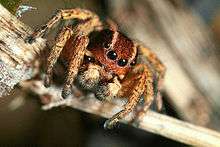Phlegra (spider)
Phlegra is a genus of jumping spiders that was first described by Eugène Louis Simon in 1876.[2] The name is a reference to a mythical location in both Greek and Roman mythology.[2]
| Phlegra | |
|---|---|
 | |
| Phlegra fasciata | |
| Scientific classification | |
| Kingdom: | Animalia |
| Phylum: | Arthropoda |
| Subphylum: | Chelicerata |
| Class: | Arachnida |
| Order: | Araneae |
| Infraorder: | Araneomorphae |
| Family: | Salticidae |
| Genus: | Phlegra Simon, 1876[1] |
| Type species | |
| P. fasciata (Hahn, 1826) | |
| Species | |
|
79, see text | |
Species
As of August 2019 it contains seventy-nine species and one subspecies, found in Eurasia and Africa, with one species (P. hentzi) occurring only in North America:[1]
- P. abessinica Strand, 1906 – Ethiopia
- P. albostriata Simon, 1901 – South Africa, Lesotho, Mozambique
- P. amitaii Prószyński, 1998 – Israel
- P. andreevae Logunov, 1996 – Central Asia
- P. arborea Wesolowska & Haddad, 2009 – South Africa
- P. atra Wesolowska & Tomasiewicz, 2008 – Ethiopia
- P. bairstowi Simon, 1886 – South Africa
- P. bicognata Azarkina, 2004 – Ukraine, Russia, Kazakhstan
- P. bifurcata Schmidt & Piepho, 1994 – Cape Verde Is.
- P. bresnieri (Lucas, 1846) – Southern Europe, Northern Africa to Turkey, Azerbaijan, Iran
- Phlegra b. meridionalis Strand, 1906 – Ethiopia
- P. certa Wesolowska & Haddad, 2009 – South Africa
- P. chrysops Simon, 1890 – Yemen
- P. cinereofasciata (Simon, 1868) – Portugal to Central Asia
- P. crumena Próchniewicz & Hęciak, 1994 – Kenya
- P. davidi (Caleb, Mungkung & Mathai, 2015) – India
- P. desquamata Strand, 1906 – Ethiopia
- P. dhakuriensis (Tikader, 1974) – Pakistan, India
- P. dimentmani Prószyński, 1998 – Israel
- P. dunini Azarkina, 2004 – Turkey, Azerbaijan, Iran
- P. etosha Logunov & Azarkina, 2006 – Namibia, South Africa
- P. fasciata (Hahn, 1826) (type) – Europe, Turkey, Caucasus, Russia to Central Asia, Iran, Afghanistan, India, China, Mongolia, Korea, Japan
- P. ferberorum Prószyński, 1998 – Israel
- P. flavipes Denis, 1947 – Egypt
- P. fulvastra (Simon, 1868) – Italy (Sicily), Syria, Israel
- P. fulvotrilineata (Lucas, 1846) – Algeria
- P. gagnoa Logunov & Azarkina, 2006 – Ivory Coast
- P. hentzi (Marx, 1890) – USA, Canada
- P. imperiosa Peckham & Peckham, 1903 – South Africa
- P. insulana Schmidt & Krause, 1998 – Cape Verde Is.
- P. jacksoni Prószyński, 1998 – Israel
- P. karoo Wesolowska, 2006 – Namibia, Zimbabwe, South Africa
- P. kulczynskii Azarkina, 2004 – Russia, Mongolia, Kazakhstan
- P. langanoensis Wesolowska & Tomasiewicz, 2008 – Ethiopia, Zimbabwe
- P. levis Próchniewicz & Hęciak, 1994 – Kenya
- P. levyi Prószyński, 1998 – Israel
- P. lineata (C. L. Koch, 1846) – Southern Europe, Turkey, Syria, Russia (Caucasus)
- P. logunovi Azarkina, 2004 – Central Asia
- P. loripes Simon, 1876 – Portugal, Spain, France
- P. lugubris Berland & Millot, 1941 – West Africa
- P. memorialis (O. Pickard-Cambridge, 1876) – Egypt
- P. micans Simon, 1901 – China (Hong Kong)
- P. nitidiventris (Lucas, 1846) – Portugal, Algeria, Tunisia
- P. nuda Próchniewicz & Hęciak, 1994 – Ethiopia, Kenya, Tanzania, Uganda, Zimbabwe
- P. obscurimagna Azarkina, 2004 – Kyrgyzstan, Kazakhstan
- P. palestinensis Logunov, 1996 – Israel
- P. particeps (O. Pickard-Cambridge, 1872) – Israel to Bhutan
- P. parvula Wesolowska & Russell-Smith, 2000 – Tanzania
- P. pisarskii Zabka, 1985 – China, Vietnam
- P. pori Prószyński, 1998 – Egypt
- P. prasanna Caleb & Mathai, 2015 – India
- P. procera Wesolowska & Cumming, 2008 – Zimbabwe
- P. profuga Logunov, 1996 – Central Asia
- P. proszynskii Zabka, 2012 – Australia (Lord Howe Is.)
- P. proxima Denis, 1947 – Egypt
- P. pusilla Wesolowska & van Harten, 1994 – Senegal to Zimbabwe, Yemen
- P. rothi Prószyński, 1998 – Israel
- P. samchiensis Prószyński, 1978 – Bhutan
- P. sapphirina (Thorell, 1875) – Algeria
- P. semipullata Simon, 1901 – China (Hong Kong)
- P. shulovi Prószyński, 1998 – Israel
- P. sierrana (Simon, 1868) – Portugal, Spain
- P. simplex Wesolowska & Russell-Smith, 2000 – Tanzania, Zimbabwe
- P. sogdiana Charitonov, 1946 – Central Asia
- P. solitaria Wesolowska & Tomasiewicz, 2008 – Ethiopia
- P. soudanica Berland & Millot, 1941 – Mali
- P. stephaniae Prószyński, 1998 – Israel
- P. suaverubens Simon, 1886 – Senegal
- P. swanii Mushtaq, Beg & Waris, 1995 – Pakistan
- P. tenella Wesolowska, 2006 – Namibia
- P. tetralineata (Caporiacco, 1939) – Ethiopia, Iran
- P. theseusi Logunov, 2001 – Greece (Crete)
- P. thibetana Simon, 1901 – Bhutan, China
- P. tillyae Prószyński, 1998 – Israel
- P. touba Logunov & Azarkina, 2006 – Ivory Coast, Nigeria
- P. tristis Lessert, 1927 – Congo, Kenya
- P. v-epigynalis Hęciak & Prószyński, 1998 – Israel, Syria
- P. varia Wesolowska & Russell-Smith, 2000 – Tanzania
- P. yaelae Prószyński, 1998 – Tunisia, Israel
- P. yuzhongensis Yang & Tang, 1996 – China
gollark: SATA disks are probably easier since you can just pull both cables out easily.
gollark: Ah.
gollark: What are you trying to do anyway? Remove the HDD?
gollark: Truly this is ancient technology.
gollark: Apparently the designers of this laptop were going for "kind of user-servicable but not really", so does anyone have any idea how I can replace this HDD? I couldn't find anything on YouTube and the manufacturer seems to be missing repair manuals.
References
- "Gen. Phlegra Simon, 1876". World Spider Catalog Version 20.0. Natural History Museum Bern. 2019. doi:10.24436/2. Retrieved 2019-09-11.
- Simon, E. (1876). Les arachnides de France. Tome troisième. Roret, Paris.
This article is issued from Wikipedia. The text is licensed under Creative Commons - Attribution - Sharealike. Additional terms may apply for the media files.